Press Releases
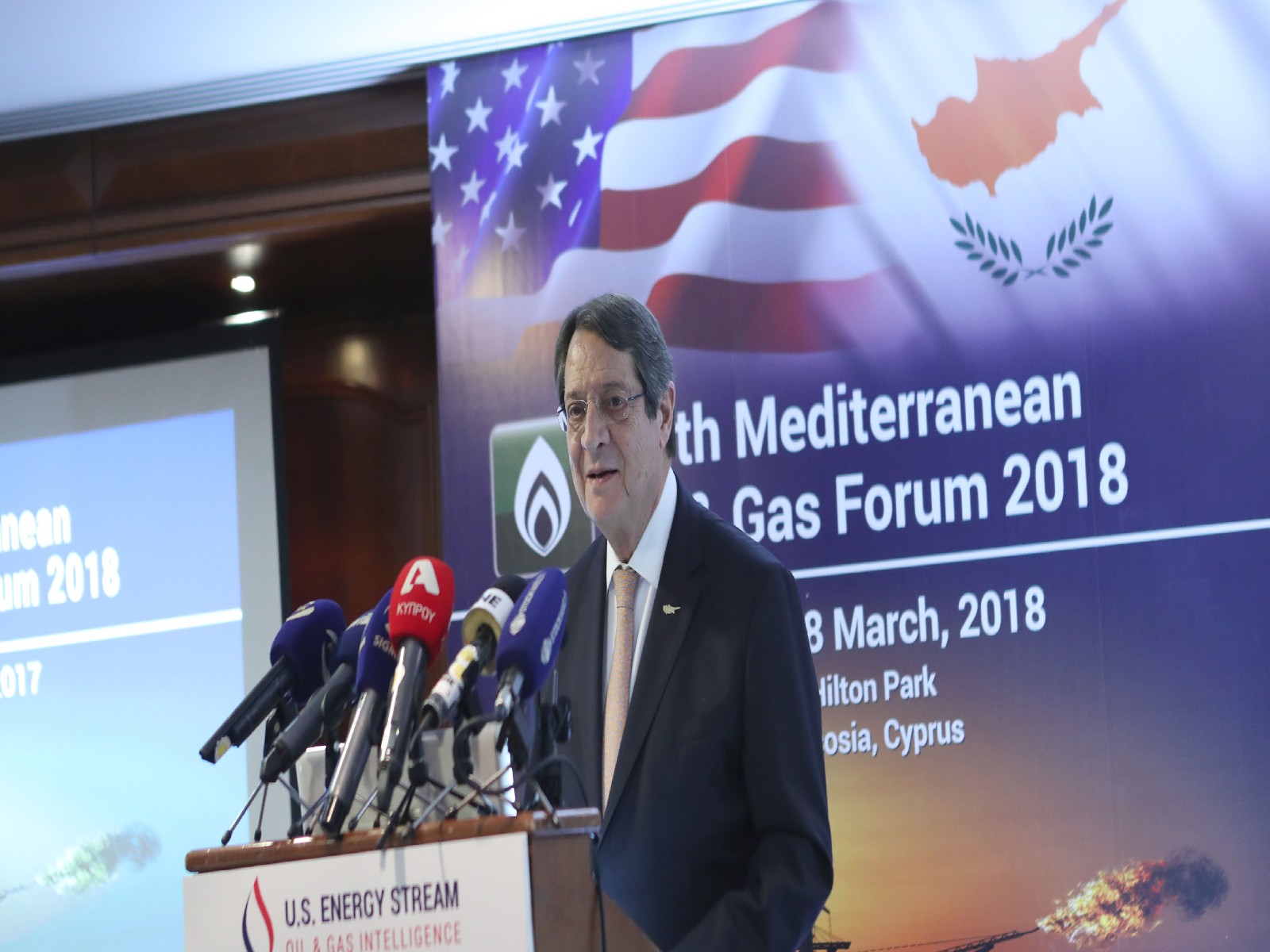
27-03-2018 11:38
Keynote speech by the President of the Republic, Mr Nicos Anastasiades, at the 9th Mediterranean Oil and Gas Forum
From the outset, I would like to sincerely thank the Organisers of the event, the US energy stream, for providing me with the opportunity to briefly outline the hydrocarbons development strategy of the Republic of Cyprus to such a distinguished audience.
At the same time, I would like to warmly welcome to Cyprus all delegates who have joined us from abroad.
As experts in your fields, you have first-hand knowledge of our pursued strategy in developing the Republic’s hydrocarbons sector, based on transparent and solid regional cooperation, as well as the consistent implementation of our ambitious exploration program.
To this end, we have set very specific targets.
Over the past few years we have, in fact, made some remarkable steps towards the realization of our exploration program, which we aspire will soon establish Cyprus as a natural gas producer and a transit country.
At present, the Ministry of Energy and the “Aphrodite” consortium are engaged in advanced discussions to establish, the soonest possible, the Development and Production Plan of the “Aphrodite” gas field.
At the same time, since last year’s forum, there has been much progress regarding the exploration activities in the Exclusive Economic Zone of the Republic of Cyprus, which I would like to briefly touch upon.
Following the Republic’s 3rd licensing round and the decision to grant hydrocarbon exploration licenses for Blocks 6, 8 and 10, to ENI/TOTAL, ENI and ExxonMobil/Qatar Petroleum respectively, we anticipate with eagerness the completion of the exploration program of all licensed companies.
The second wave of exploration in the Cyprus Exclusive Economic Zone was initiated by the TOTAL/ENI consortium.
After the renewal of its Exploration License for Block 11, in February 2016, the consortium went ahead with its exploration program, drilling their first well between June and September 2017. The “Onesiphoros West 1” well resulted in a technical discovery that confirmed the existence of a petroleum system and the presence of a “Zohr”-like, reservoir.
A mere two months ago, in January, we also had the completion of the first exploration well in Block 6 by the consortium of ENI and TOTAL. The “Calypso” well encountered an extended gas column with excellent characteristics. This discovery also confirms the presence of the “Zohr”-like play in the Cypriot Exclusive Economic Zone.
Next on the agenda will be the drilling activities of the ExxonMobil/Qatar Petroleum consortium in Block 10, which include two back-to-back exploration wells during the second half of this year.
Besides any technical challenges we might face and which we can tackle with the extensive knowhow of our valuable partners, we recently faced acts of gun-boat diplomacy by Turkey in the Exclusive Economic Zone of the Republic, in violation of European and international law, including the United Nations Convention on the Law of the Sea.
Acts which physically obstructed the Italian energy firm ENI from reaching its planned drilling area in Exploration Block 3 of our Exclusive Economic Zone.
These illegal acts and provocations not only undermine the interests and objectives of Cyprus, but also the EU’s strategy goal of achieving energy security and diversification of sources and routes.
At the same time, no one can deny that Turkey’s actions are aimed at achieving the country’s long-term goal of becoming an exclusive energy supply hub for the European Union, either from Russian sources or the Caspian basin, or even, as we can conclude from recent events, to control the natural gas supply from the Eastern Mediterranean to Europe.
In this respect, I would like to express my satisfaction with the strong expression of solidarity by the EU regarding the recently – adopted conclusions by the Council.
For the first time there is an unprecedented strong condemnation of Turkey’s continuing illegal activity in the Eastern Mediterranean, which of course includes the Exclusive Economic Zone of Cyprus.
Another element is the fact that the EU will be vigilant following the implementation or not of the conclusions.
I do hope that Turkey will finally adopt the realistic approach of changing tactics and behaviour, in line with international law and European standards, principles and values, in order to achieve progress in what matters to both the EU and all of us. This would be to the benefit of all, including our immediate region.
After all, Turkey’s pretext that it is acting to protect the interests of the Turkish Cypriots is completely unfounded since:
(1) We have repeatedly and publicly stated that the natural resources of the Republic of Cyprus belong to all Cypriots, Greek and Turkish Cypriots alike.
(2) There is a convergence from the previous round of negotiations on the issue of exploration and exploitation of natural resources that decisions with regards to the maritime areas will be a federal competence in reunited Cyprus. This convergence was indeed reconfirmed in the latest round of negotiations, and was never challenged by the Turkish side.
(3) The Republic’s goal is to fully explore and exploit the hydrocarbon potential in its exclusive economic zone, in the best terms possible, so as to maximize the benefits for all Cypriot citizens.
To this end, we have submitted for approval to the House of Representatives a bill, which creates a sovereign fund for the management of any future hydrocarbon resources, safeguarding the interests of current and future generations of all Cypriots, based on the Norwegian model, internationally recognized principles and best practices.
Distinguished guests,
Cyprus’ policy has traditionally been based on regional cooperation and the establishment of long-lasting relationships with all of our neighbours. As we have always maintained, collaboration and synergies achieved in the hydrocarbons sector of the Eastern Mediterranean, can feed into the political relations between countries, building the foundations for regional stability and peace.
The Republic of Cyprus, therefore, has set as one of its main policy objectives the promotion of cooperation with our neighbours in the field of energy.
Thus, the initiatives undertaken by Cyprus have been highly successful at the bilateral and multilateral levels, with countries such as Lebanon, Israel, Egypt, Jordan and Greece.
At the same time, the recent deal struck between Israel and Egypt is concrete proof that collaborations between countries in the region are already taking place, and Cyprus, I can assure you, will be an active participant in future developments.
These developments also align with the EU’s recent Energy Union strategy, which has confirmed the Mediterranean as a strategic priority for reducing EU’s dependency on existing energy suppliers and routes.
Our aim remains to support the EU in its diversification efforts, with Cyprus, as an EU member state, having a stable legal and political environment and constituting a reliable partner for both neighbouring countries and oil and gas companies.
Further to the above and having in mind the absence of electricity or gas interconnections linking our island with the EU internal energy market, the competent Ministry of Energy is promoting the realization of the necessary energy infrastructure to lift Cyprus’ isolation and enhance regional cooperation through common projects.
To this end, the Republic of Cyprus is promoting three projects that were selected by the European Commission as Projects of Common Interest, because of their benefits for the completion of the European energy market:
- The “CyprusGas2EU” which aims at allowing the transport of gas from the Eastern Mediterranean to Europe. By 2020, Cyprus will construct a Floating Storage and Regasification Unit (FSRU) in order to import gas in the form of LNG from international markets.
- The “EastMed Pipeline” which aims to transport gas from Cyprus and the Eastern Mediterranean to Europe via Crete and mainland Greece.
- The “EuroAsia Interconnector”, an electricity connection between Israel, Cyprus and Greece that is supported by all three governments.
Recently, two of these projects have secured EU funding. In particular, 101 million euro will be allocated to the “CyprusGas2EU” project, whilst the “EastMed Pipeline” has been awarded 34.5 million euro for the technical studies.
We intend to continue exercising Cyprus’ rights as an independent and fully integrated Member State of the European Union, proceeding with our exploration program as planned.
This is also part of our broader policy in that the discoveries of significant quantities of natural gas in the Eastern Mediterranean, as well as potential future discoveries, can be a driver for stabilization in the region.
After all, together with the respect by all parties of international law and national sovereign rights, this is the kind of stable and predictable environment that we are obliged to jointly create, in order to bring in the multibillion investments needed for developing the East Med’s hydrocarbons wealth.
We mean business when we say we want Turkey as an ally. But not as one who is a trouble maker or one who is intervening with the sovereign rights of the Republic of Cyprus.
Our intention is to insist that the best solution of these is the solution of the Cyprus problem, but what we need as well are policies which are in line with international law, European law, the Law of the Sea.
(RM/ML/SCH)
Relevant Press Releases
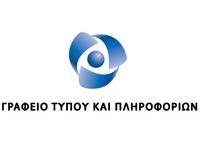
19-04-2024 16:42
PIO e-mail Αlerts service is suspended
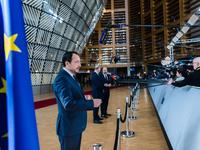
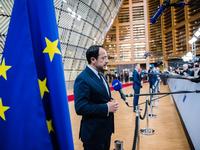
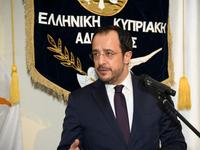

15-04-2024 14:04
The Ambassador of Cyprus to South Sudan presented her credentials


